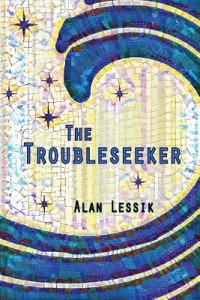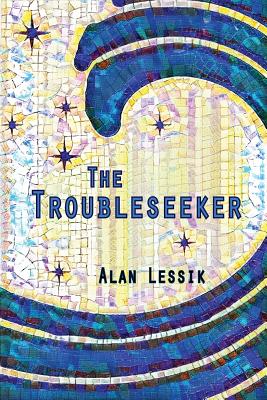 The Troubleseeker
The Troubleseeker
by Alan Lessik
Chelsea Station Editions. 268 pages, $18.
THIS STUNNINGLY CREATIVE NOVEL combines history and mythology from several cultures to tell the story of Antinio, a gay Cuban man, as he searches for freedom and love in the face of oppression and disease. It is narrated by Hadrian, the brilliant emperor of ancient Roman whose male lover Antinous died by drowning at age nineteen, whereupon Hadrian made him a god and had statues of Antinous erected all over the Empire. Hadrian, now a disembodied demi-god with limited supernatural powers, takes an interest in Antinio, actively saving his life on several occasions. He also meets with several of the Greek gods and with the orishas of the Santería faith—who migrated to Cuba from Africa during the slave trade—learning about their role in human affairs. It is an unusual blend, but holds together throughout to tell a compelling story. There is a helpful character guide at the beginning.
Antinio’s story begins in childhood, under the Castro regime. Skilled in languages, after an eventful stint in the military, he works as a translator in the Ministry of Culture, assisting visiting artists and performers. This job also helps him to meet many like-minded men, and he has a few passionate affairs. Unfortunately, due to Cuba’s macho culture and the leadership’s repressive stance on homosexuality, he must keep his feelings and relationships a secret, even from his family. This leads to powerful feelings of guilt and shame, enough to create a chorus of Lamenters, Shriekers, and a Siren, which torment him throughout his life. He also has a brief relationship with a woman, which leads to children; his relationship with them will come to haunt him.
After a botched attempt to escape to East Germany, Antinio finds another opportunity when the Cuban government allows homosexuals and other undesirables to leave via the Mariel Boatlift. This makes for an unusual scene, when Antinio, who has always presented himself as a “macho” type, must now adopt the stereotype of the effeminate gay man to the authorities to convince them that he’s gay. He arrives in the U.S., ending up in Minnesota, where he struggles to adjust to an unfamiliar climate and culture. He begins to find community, work, and lovers, but he’s hit hard by the AIDS crisis. Despite Hadrian’s power, he cannot save Antinio. But he can tell his story.
A love of language infuses the novel. The characters’ names are mostly derived from Greek mythology and language. Antinio’s wife is Circe and his sons are named Icario and Polideuces. His best friend is Erato, the muse of love and erotic poetry. A bully is named Apolion, from the word for destroyer. Even the novel’s title, according to Hadrian, comes from a translation of the hero Odysseus’ name, which literally means “to be grieved at.” (The actual etymology of Odysseus is uncertain.) As a young man Antinio falls in love with the constructed international language Esperanto, and his job in the U.S. involves creating a computer program that can translate any language. Spanish is also scattered throughout the novel.
The gods and orishas play an unusual, sometimes troubling role in the story, helping to influence human affairs while generally staying away from individual people. Babalu Aye, responsible for disease and healing, is the creator of HIV, although he takes no responsibility for its effects. This reader could not help but remember certain religious figures who declared AIDS to be God’s punishment for homosexuality. Not that the novel is suggesting that, but it’s an uncomfortable association nonetheless. That said, with its accessible writing, a compelling central character, and a fascinating blend of languages and cultures, The Troubleseeker is a powerful first novel.
________________________________________________________
Charles Green is a writer based in Annapolis, Maryland.







Discussion1 Comment
Pingback: The Troubleseeker: a Stunningly Creative Novel-Gay & Lesbian Review – Alan Lessik